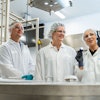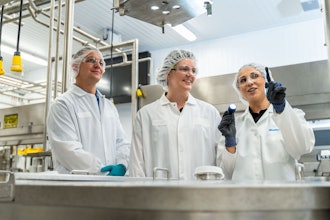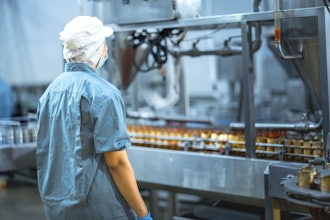MINNEAPOLIS, June 12, 2019 (PRNewswire) — Cargill on Wednesday released a collection of sustainability reports across four key businesses: Aqua Nutrition; Cocoa and Chocolate; Ocean Transportation; and Premix and Nutrition.
The 2018 reports reflect Cargill's comprehensive approach to sustainability, with a focus on creating connections across industry, government and communities that foster meaningful change and workable solutions to the world's biggest sustainability challenges.
The reports provide insight into how Cargill addresses the impacts of climate change and delivers sustainable solutions that are transparent, innovative and collaborative. In addition, they highlight progress made on specific goals in key areas such as direct sourcing, improving traceability, building up the socioeconomic resilience of farmers and protecting ocean and aquatic life.
"Our work in sustainability focuses on reducing the environmental and social impact throughout our global operations," said Ruth Kimmelshue, chief sustainability officer for Cargill. "Customers and consumers are looking to agriculture and industry to be part of the solution, protecting both people and the planet. These reports showcase critical efforts on that journey—efforts that increase efficiency in our supply chains, reduce resource use, lessen our carbon footprint and develop products to help our customers do the same."
Healthy Seafood for Future Generations: Cargill Aqua Nutrition supports the sustainable growth of the global aquaculture industry and its transformation towards more sustainable seafood production.
- Cargill continued collaborations with suppliers to achieve IFFO RS certifications for factories and MSC certifications for fishery sustainability. In 2018, 90 percent of the total marine ingredients sourced came from IFFO RS certified facilities.
- The business engaged in fishery improvement projects around the globe and worked with WWF on a major project to assess our sourcing of marine ingredients and identify areas for improvement.
- Working alongside farmers, Cargill developed nutritional innovations that improve fish performance, health and welfare, which helps farmers succeed. For example, in 2018 the business launched a new dietary package that supports skin health and enables fish to recover quickly from skin damage.
Cocoa & Chocolate: Cargill is committed to leading the industry towards a thriving cocoa sector, by increasing supply chain traceability, empowering cocoa farmer and tackling pressing issues using the power of technology. The company's aim is to improve the lives of cocoa farmers and their communities across the five countries where it sources cocoa – Brazil, Cameroon, Côte d'Ivoire, Ghana, Indonesia.
- Cargill provided Good Agricultural Practices (GAPs) training and coaching to over 200,000 cocoa farmers worldwide. In Côte d'Ivoire, Cargill has seen GAP adoption rates double (from 14% to 28%), with farmers able to boost their productivity and manage their farms more sustainably.
- The business completed GPS polygon mapping of more than 110,000 farmers and the assessment of 188,065 hectares of forest within Cargill's direct cocoa supply chain (in partnership with Global Forest Watch). This work establishes a baseline identifying where the cocoa comes from, which areas may be at risk of deforestation and how to mitigate this risk through specific interventions.
- A full needs assessment was completed in 137 communities in Côte d'Ivoire and Ghana, which will serve as the basis for Community Action Plans (CAPs) to enable community leaders to evaluate local needs, identify available resources or areas for development, and define their path forward.
Ocean Transportation: Cargill is committed to improving the sustainability of its operations and leading the maritime industry to a more sustainable future. In 2018, the business made important progress toward carbon emissions reduction targets, chartering more energy efficient vessels and preparing for sulphur emissions changes.
- Cargill was a driving force in helping to develop – and one of the first six companies to sign – the GMF CEO Declaration. Issued in October 2018, this call to action has been signed by more than 50 industry leaders from across the global maritime value chain urging the industry to transition toward a decarbonized future.
- The business made substantial headway in climate change and health, reaching a 12.1% decline in CO2 output per cargo-ton-mile across time-chartered fleet since 2016. This keeps the business on course to achieve its 2020 goal of a 15% reduction. In 2018, the business reduced gross CO2 emissions 350,000 tons (4.5%) while it maintained the same level of transport activity.
- The business also exceeded its 2020 target for safety performance – increasing its share of 4- and 5-star rated ships. And it reported no incidents of oil spills above 10m3.
Premix and Nutrition: Cargill works collaboratively with partners, farmers and customers to build a socially responsible, environmentally sound and economically viable animal nutrition supply chain. The company's premix and nutrition division launched critical efforts to improve feed efficiency, reduce emissions and increase transparency.
- Improved operational efficiency has reduced the energy used per ton of product by 3.7% in 2018 and reduced GHG emissions by 2.4% per ton of product.
- Cargill products have been shown to lower methane from cows by up to 10% and ammonia from chickens and pigs by up to 50%.
- Moving forward, the business has made a commitment that all future animal nutrition products and services will have a sustainability advantage.
"While we have made great strides, as outlined in our sustainability reports, none of this can be accomplished alone," added Kimmelshue. "Together with partners, customers and other industry leaders, we are increasing access to safe and nutritious food, supporting farmers and communities and advancing climate solutions in our supply chains."
Visit www.cargill.com/sustainability/supply-chains to learn more about Cargill's efforts to drive sustainability across its operations.



















